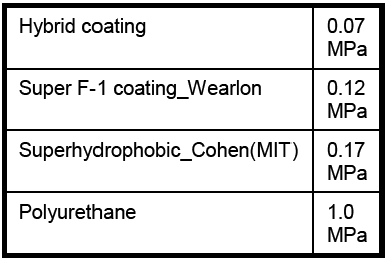Engineering and physical science
Novel Anti-Adhesive, Anti-Icing Coatings and Methods for Production
Minimizing adhesion of biofouling is a major goal for several industries. Marine biofouling, for example, affects shipping, naval vessels, aquaculture and offshore oil operations and leads to numerous problems including increased drag on vessels, increased fuel charges and decreased operational efficiency. In addition, icing on aircrafts leads to increased fuel consumption, engine damage and pollution from the current de-icing agents, and has been estimated to decrease power production by wind turbines by almost 50%. To solve this problem, various biocides have been incorporated in coatings; however, this often results in leached biocides that are harmful to the environment. To solve this, silicone-based nontoxic coatings have been used, but their durability and toughness are not adequate.
The technology
Researchers at Virginia Commonwealth University have developed anti-adhesive coatings to minimize fouling in a variety of applications. These coatings have good oil resistance and a strong adhesive effect with respect to seaweed, barnacles, and other marine organisms, but unlike the current technology, these coatings are nontoxic and environmentally friendly. They could be used to prevent adhesion of ice, which could greatly reduce expenses associated with icing on airplanes, ships, power lines and wind turbines. These coatings have several advantages including improved toughness while maintaining surface characteristics that minimize adhesion of fouling and ice. They are also easily manufactured and adaptable to a variety of commercially available resin intermediates. The technology involves a new purification process for fluorous polyoxetane diols, which is important for independently enhancing coating surface and bulk mechanical properties.

Figure 1. Ice release properties
